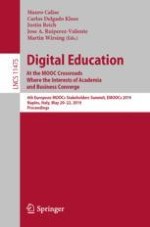2019 | Buch
Digital Education: At the MOOC Crossroads Where the Interests of Academia and Business Converge
6th European MOOCs Stakeholders Summit, EMOOCs 2019, Naples, Italy, May 20–22, 2019, Proceedings
herausgegeben von: Prof. Mauro Calise, Carlos Delgado Kloos, Dr. Justin Reich, Jose A. Ruiperez-Valiente, Prof. Dr. Martin Wirsing
Verlag: Springer International Publishing
Buchreihe : Lecture Notes in Computer Science
